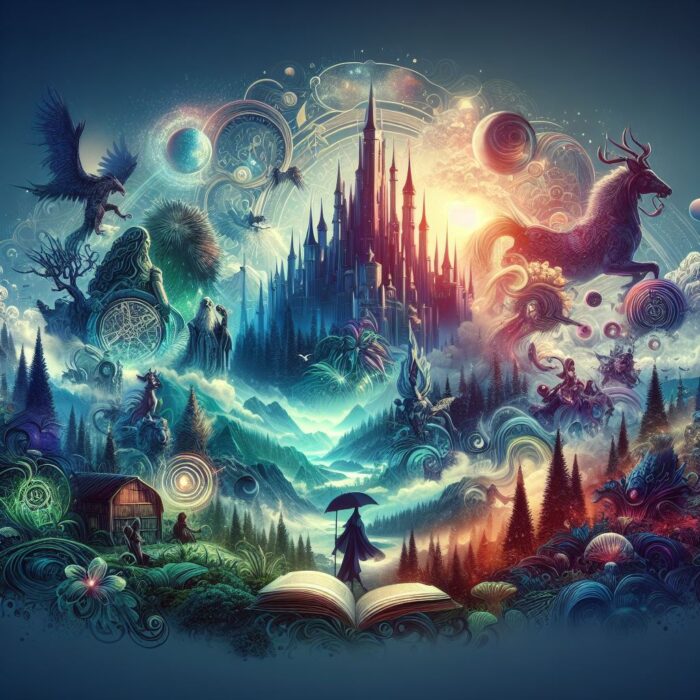I. Introduction
From the epic quests of “The Lord of the Rings” to the magical adventures of Harry Potter, fantasy literature has captivated readers across generations. These immersive tales transport us to realms where the impossible becomes reality, igniting our imagination and providing an escape from the mundane. This guide aims to explore essential fantasy books that have left an indelible mark on the genre, offering readers of all ages a gateway to unlock the enchantment of imaginary realms.
II. Defining Fantasy Literature
Fantasy literature encompasses stories that introduce fantastical elements, such as magic, mythical creatures, and alternate worlds, into a narrative. This genre often defies the boundaries of reality, allowing authors to craft intricate worlds governed by unique rules and laws. Within fantasy, various sub-genres have emerged, including high fantasy, which takes place in entirely fictional settings, urban fantasy, where magical elements intersect with the modern world, and magical realism, which blends the ordinary with the extraordinary.
III. Exploring the Classics
J.R.R. Tolkien’s “The Lord of the Rings” Trilogy
J.R.R. Tolkien‘s “The Lord of the Rings” trilogy stands as a monumental achievement in fantasy literature. This epic saga follows the hobbit Frodo Baggins and his companions as they embark on a perilous quest to destroy the One Ring and defeat the dark lord Sauron. Tolkien’s masterful world-building, intricate mythology, and exploration of timeless themes like courage, friendship, and the struggle between good and evil have cemented this trilogy as a cornerstone of the genre.
C.S. Lewis’s “The Chronicles of Narnia” Series
C.S. Lewis’s beloved “The Chronicles of Narnia” series transports readers to the fantastical land of Narnia, where talking animals, mythical creatures, and powerful magic coexist. Through the adventures of the Pevensie children, Lewis weaves allegorical tales that explore themes of faith, sacrifice, and the battle between good and evil. The series’ enduring popularity can be attributed to its captivating storytelling and the timeless lessons it imparts.
J.K. Rowling’s “Harry Potter” Series
J.K. Rowling’s “Harry Potter” series is a cultural phenomenon that has captured the hearts and imaginations of readers worldwide. Following the journey of the young wizard Harry Potter and his friends as they navigate the wizarding world, these books tackle themes of friendship, courage, and the eternal struggle between good and evil. The series’ immense popularity can be attributed to Rowling’s masterful world-building, complex character development, and the relatable themes that resonate with readers of all ages.
IV. Hidden Gems
Robin Hobb’s “The Farseer Trilogy”
Robin Hobb’s “The Farseer Trilogy” is a hidden gem that deserves recognition for its intricate storytelling and character development. The trilogy follows the life of FitzChivalry Farseer, a skilled assassin and royal bastard, as he navigates the complex political landscape of the Six Duchies. Hobb’s masterful characterization and intricate world-building create a rich tapestry that immerses readers in a world where magic, political intrigue, and personal struggles intertwine.
Naomi Novik’s “Uprooted”
Naomi Novik’s “Uprooted” is a captivating novel that blends fantasy elements with Slavic folklore. The story follows Agnieszka, a young woman chosen by a powerful wizard to serve as his assistant, as she navigates a world where ancient evils threaten the safety of her village. Novik’s lyrical prose, intricate magic system, and exploration of themes such as identity and sacrifice make this novel a must-read for fantasy enthusiasts.
Brandon Sanderson’s “Mistborn” Series
Brandon Sanderson’s “Mistborn” series is a testament to his prowess in world-building and storytelling. Set in a world where a powerful, immortal ruler has subjugated humanity, the series follows a crew of unlikely heroes who possess the ability to ingest and “burn” metals, granting them incredible powers. Sanderson’s unique magic system, complex characters, and intricate plot twists have earned him a devoted following among fantasy readers.
V. Beyond the Books: Exploring Fantasy Adaptations
The enduring popularity of fantasy literature has transcended the written word, inspiring countless adaptations in various media forms. From Peter Jackson’s critically acclaimed “The Lord of the Rings” film trilogy to the captivating television series “Game of Thrones,” based on George R.R. Martin’s “A Song of Ice and Fire” novels, these adaptations have brought the magic of fantasy to life on the big and small screens. Additionally, the gaming industry has embraced fantasy elements, with franchises like “The Elder Scrolls” and “The Witcher” offering immersive experiences that allow players to embark on their own fantastic adventures.
VI. Building Your Fantasy Library
Building a diverse and engaging fantasy library is an ongoing journey for any avid reader. Start by exploring the classics and hidden gems mentioned in this guide, and then delve deeper into the works of authors who pique your interest. Seek recommendations from fellow fantasy enthusiasts, join online communities dedicated to the genre, and keep an eye out for new releases from both established and emerging authors. Remember, a well-rounded fantasy collection should encompass a variety of sub-genres, styles, and perspectives, ensuring a rich and captivating reading experience.
VII. Frequently Asked Questions (FAQ)
A must-read fantasy book is typically characterized by its enduring popularity, critical acclaim, and significant impact on the genre. These books often feature intricate world-building, compelling characters, and thought-provoking themes that resonate with readers across generations.
Explore the book’s description, reviews, and recommendations from trusted sources to gauge its content, writing style, and overall tone. Additionally, consider the sub-genre and any specific themes or elements that appeal to your personal interests.
Absolutely! Many fantasy books cater specifically to younger readers, offering age-appropriate content and themes that foster imagination and learning. Examples include “The Graveyard Book” by Neil Gaiman, “The School for Good and Evil” series by Soman Chainani, and “The Chronicles of Prydain” by Lloyd Alexander.
While historically underrepresented, recent years have seen a growing number of fantasy books featuring diverse characters and perspectives. Authors like N.K. Jemisin, Tomi Adeyemi, and Rebecca Roanhorse have gained critical acclaim for their works that celebrate cultural diversity and challenge traditional narratives within the genre.
Engage with online communities, attend book fairs or conventions, follow book bloggers and reviewers, and explore curated lists or recommendations from trusted sources. Additionally, don’t hesitate to ask for suggestions from fellow readers or bookstore staff.
Common tropes in fantasy literature include the hero’s journey, magical artifacts, fantastical creatures, and the struggle between good and evil. Recurring themes often explore concepts like courage, friendship, sacrifice, and the nature of power and authority.
Fantasy literature provides an escape from the constraints of reality, allowing readers to immerse themselves in worlds limited only by the author’s imagination. These imaginative realms offer a reprieve from daily life, while also encouraging readers to explore their own creativity and perspectives.
VIII. Conclusion
The enchanting world of fantasy literature offers an escape from the ordinary, inviting readers to embark on extraordinary adventures alongside beloved characters. From the sprawling epics of Tolkien to the hidden gems of contemporary authors, the books explored in this guide have captivated generations of readers with their rich world-building, compelling storytelling, and thought-provoking themes. As you delve into these must-read fantasy books, may you find solace, inspiration, and a renewed appreciation for the boundless realms of imagination.




